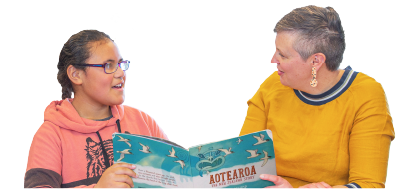Developing local curriculum
Show video transcript
Title slide: Developing local curriculum
Dr Ali Glasgow, Victoria University, facing camera
I take some of the things that I learned from my PhD because I looked at three language nests, as my case study settings. And it's, the environment can actually be developed so that it actually demonstrates, this is a Pacific place. So having our banana plants, having our weaving, having artifacts from around the Pacific, which when you walk in it's like, “Oh, I'm back home in a village”. Making this place a village, so teachers are committed to... and language, learning the phrases, learning the songs. Even if I'm not from the Pacific myself, making a dedicated commitment in my intentional teaching to bring in Pacific pedagogy and practices.
So it may be how I start the day off with a lotu or a prayer, because that's what would happen back home. And it may not be just about the Christian thing, it's about how we come together in this place, in a spiritual way. That's how I start my day off. Making sure that I look at who I have in my centre, particularly if I have Polynesian children and Pacific children. What are the communities they come from? And make sure that I have a lot of that evidenced in my programme. So I have their books. I use them as my experts. I look to my parents and say, “what more would you like?” “Can you come in?” “Can you show me how to make palusami?” “Can you show me how to scrape the coconut?” What are the things that children would be learning at home that I need to put in my programme here and make it really entrenched, you know, in their practice.
Phil Muir, Principal, Northcote Intermediate, Auckland, facing camera
So our local curriculum and our classroom curriculum, we're really blessed at the moment because we've got so much going on locally.
We've got a hugely, richly saturated bunch of local opportunities for us to explore. And each of the organisations doing those wants to connect with us as a school and they have connected with us, so we can readily explore local curriculum opportunities. It's a matter of giving teachers the confidence to say, “Yes, I'm going to work with this organisation and it's going to fit into our curriculum because it's our community”. So it's seeing what opportunities we've got that are real, that are happening now, that are meaningful and linking them in with our plans of learning. We’ve looked at pedagogy, we've looked at you know how we can make cross-curricular collaborative project-based learning happen, and that's something we're continuing to explore. We've got some good benchmarks set there. We're exploring more concepts with our, the DMIC Programme, and developing mathematical inquiry communities, which is something special too – which really looks at culturally responsive practice. So there's lots happening. Once again it boils down to connecting and engaging with your learners and giving your staff the confidence and the skillset to be able to make good things happen.
This video is about developing local curriculum and best practices. Ali Glasgow, Victoria University, talks about making a dedicated commitment to intentional teaching and the things that children learn at home that need to be included in classroom programmes. Phil Muir describes culturally responsive practice; finding out what meaningful opportunities are currently out there and linking them with existing teaching plans. Making cross-curricular, collaborative, project-based learning happen, and continually exploring best practices, is at the heart of an integrated approach to developing a local curriculum that resonates and relates to each learner so they feel supported and empowered.
Reflections for individual teachers
As you watch this video, think about effective pedagogy for your Pacific learners.
- Share your understanding of your local curriculum. Think about whose voices help to share your local curriculum.
- How do you ensure that your curriculum is authentic and relevant to your Pacific learners? How can you make your curriculum more relevant and authentic?
- What is most important to you – content knowledge or skills? Share your thoughts.
Do you have a clear focus supporting the progress of your Pacific learners? How are you integrating their Pacific worldview into classroom learning?
Reflections for staff or departments
As you watch this video, as a staff member or a member of department staff, think about the process of designing your local curriculum, how are decisions made? When conducting reviews do you engage your community?
- When developing your local curriculum, how do you decide what is most important for Pacific learners in your school?
- How can your school be responsive to the needs, identity, language, culture, interests, strengths and aspirations of Pacific learners and their families?
- How is your school assisting Pacific learners’ to engage with the knowledge, values, and competencies so that they become confident and connected lifelong learners? In regards to your local curriculum, what support are you providing for your teaching staff to enable them to be responsive to the priorities and preferences of Pacific learners and their community?

